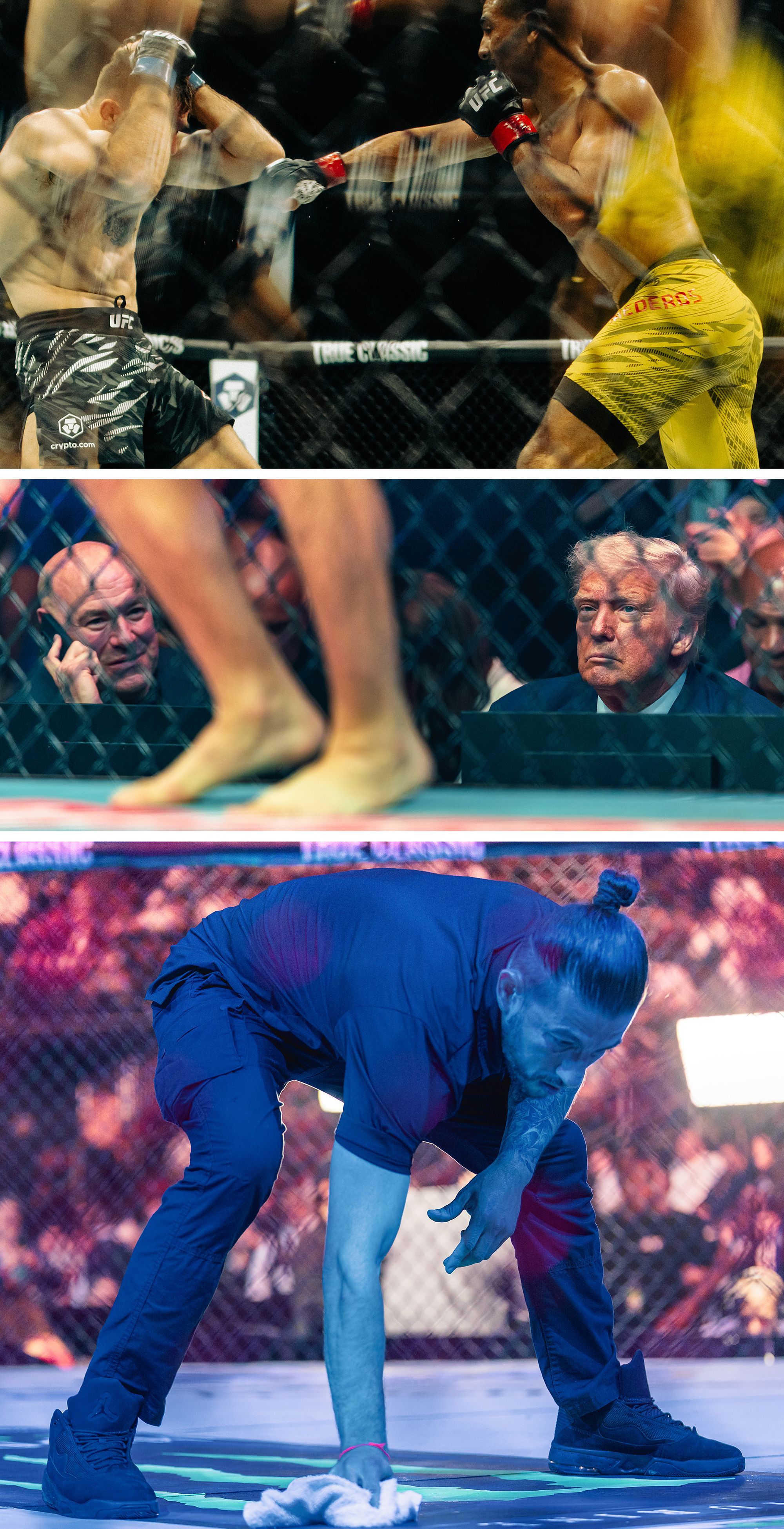
Mixed Martial Arts, and, by proxy, the Ultimate Fighting Championship, was once banned in 36 states and on pay-per-view (which did allow adult films). In the early days, about the only way to watch was to wait for your local video store to get a copy of the most recent card.
Republican Sen. John McCain of Arizona (who later became a fan) dubbed it "human cockfighting." He wasn't completely wrong. There were so few rules at the time that fighters at UFC 4 had to make a gentlemen's agreement to not pull hair.
Even into the 2000s, the sport -- and few even considered it an actual sport -- was going nowhere. Little credibility. Limited visibility. An uncertain future.
Flash forward to July 4, 2026, when the UFC plans to set up an Octagon on the south lawn of the White House and stage a full fight card, likely nationally broadcast, as part of the 250th anniversary celebration of the country's founding.
Only in America, as the adage goes.
"If I said something like this would happen 20 years ago, people would have said: This guy is out of his mind," UFC chief executive Dana White told ESPN.
White is the ultimate MMA believer and one of the greatest promoters/hype men in history. Neither humility nor looking backward pays the bills. Yet the idea of his sport and his company being in such a spotlight feels different. It is almost unfathomable.
He thinks about the early fans who never wavered and spread the word. Or the fighters and trainers who found a passion. Or just anyone, from local gym owners to minor sponsors, who helped push MMA into the mainstream. It was one step and then another.
"The fact that a combat sport is the one that was picked to be played at the White House, it is just a badge of honor," White said.
He knows how unlikely this was. In 2001, White, along with Las Vegas casino executives Frank and Lorenzo Fertitta, bought the UFC for just $2 million. By 2004, they almost gave up.
White said the Fertittas had pumped $30 million into the business. White, meanwhile, had tried everything to gain traction. Little was working.
"The worst moment was the day that Lorenzo called me and said: I can't keep doing this. I can't keep spending money on this thing," White told ESPN.
White went looking for a buyer but said he didn't think they could get much more than $7 million. The Fetittas decided to stay the course, risking good money after bad. Or at least what seemed to be bad.
A deal with Spike TV to air the reality show "The Ultimate Fighter" in 2005 changed everything though. Given the slightest breakthrough, the UFC took off. Earlier this week, it agreed to a seven-year, $7.7 billion broadcast deal with Paramount.
The growth and money are great, of course. White though is proud of the call he received earlier this summer from President Donald Trump, a longtime personal friend and combat sports fan. Trump told White that he wanted the UFC to be part of the United States' Semiquincentennial celebration by staging fights at the White House.
"I said: Yes sir, I'll get it done," White said.
Did White think the president was joking?
"He doesn't joke," White said. "He says some funny s---, but he doesn't joke."
Presidents and sporting events have long been linked, but it's mostly been baseball or football or basketball or golf. Maybe a NASCAR race when looking for votes.
MMA, though? Cage fighting?
Trump became the first U.S. president to ever attend a fight in 2019 when he sat Octagon-side for UFC 244 at Madison Square Garden.
That was big. This White House plan is historic.
White acknowledges that his longtime friendship with Trump contributed to this decision. He said he wants to make it clear, though, that he would try to honor the request of any president regardless of politics, party or personal connection.
"Absolutely, I mean when people are talking about Trump showing up at the event, what, do you think I wouldn't do that for any president?" White said. "I'm an American. Whoever the president of the United States is, is my president."
White said his concern is now solely on how he is going to pull this off. In UFC history it has only done one other outdoor fight -- a 2010 card in Abu Dhabi.
"I hate it," White said. "I hate everything about it. You can never count on the weather."
There is no choice here though. The White House will likely serve as a dressing room and warmup area, but it can't fit an Octagon and broadcast studio. Besides, the idea is the visuals -- the White House on one side, the Washington Monument in the distance on the other.
Attendance will be limited, but White said he doesn't care. His big fears are the uncontrollables, such as fighter injuries canceling planned bouts, fights that just don't click or something he hasn't thought of yet.
Whatever, he says. The UFC has staged cards around the globe, pulled off an epic show on short notice inside the Las Vegas Sphere and, during the pandemic, even shifted operations to so-called Fight Island in the United Arab Emirates.
From White's perspective, this is a privilege, a milestone of respect that once was unfathomable.
"The president has this whole belief that the White House belongs to the American people," White said. "He wants to do more things to encourage people to come to the White House. He's got all these ideas and plans.
"Now we've just got to pull it off."

